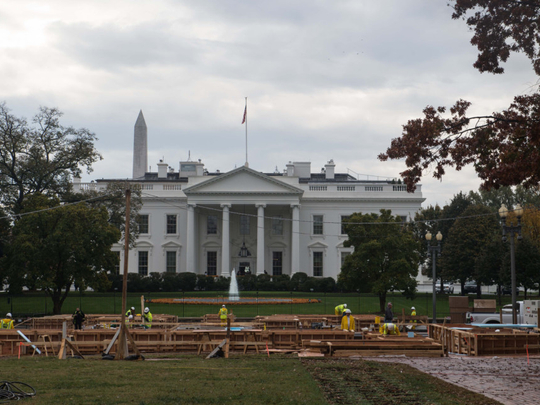
Donald Trump’s unexpected victory means the next American president will be an untested non-politician who made a list of campaign promises he can’t possibly keep; a foreign policy novice whose vows to scrap trade agreements and renegotiate alliances have alarmed America’s oldest friends; a crude braggart who derided minorities, women, the disabled and even prisoners of war.
But it’s in America’s interest to pray for his success — because the failure of an American president, especially one with Trump’s shoot-from-the-hip style, would be chaotic and destructive.
Begin with the economy. Trump’s first challenge is likely to be a slump in the financial markets; on Election Night, Dow futures plunged as his victory became clear. Can the New York mogul find the words and actions to persuade investors that he’s not the bad news they think he is?
Move on — quickly; he’ll have no choice — to foreign policy. Russian President Vladimir Putin may be celebrating, but that’s little comfort. Allies of the United States in Europe are worried; will Trump reaffirm their ties with them, which are vital to combating international terrorism, or allow them to deteriorate? China has warned that Trump’s promise to impose sanctions on its economy (for “currency manipulation” that experts say Trump is wrong about) will prompt swift reprisals; will the president-elect tell Beijing he was only kidding?
Last but not the least, consoling the American people. Fewer than half of all voters actually chose Trump; will he reach out to those who fear or loathe him? Minorities, including Latinos and African-Americans, decisively rebuffed his purported outreach in their direction; does he care?
Trump does have some assets as he approaches a job he has done little to prepare for. He will have majorities in both the Senate and House of Representatives, giving Republicans control of a one-party government for the first time since 2006. In the hands of a more conventional politician — a Mitt Romney or a Marco Rubio — this would be a golden opportunity to pass legislation to advance conservative goals, including lower taxes and tighter federal budgets.
But Trump is no mainstream Republican. To take just one glaring example: Senator Mitch McConnell, Representative Paul Ryan and Senator Ted Cruz have all argued that the only way to rein in the federal budget is by trimming future growth in Social Security and Medicare spending. Trump disagrees, emphatically.
Trump’s fiscal campaign promises simply no to add up. He’s said he will balance the budget and cut taxes, but expand Social Security and increase military spending. That can’t be done. He’s promised steel workers in the Rust Belt and coal miners in Appalachia that he’ll bring their old jobs back; that’s not likely to happen, either.
Still, some of his agenda can be achieved through legislation. He can repeal Obamacare, President Barack Obama’s health insurance programme — and leave the details of what should replace it to Congress. He can almost certainly win funding to deport more undocumented immigrants and build a wall on the southern border — the cost of which, he says, will be reimbursed by the Mexican government. (Mexico says it will do no such thing.)
And many of Trump’s biggest promises on trade, immigration, national security and foreign policy can be achieved through executive action.
He has said his first order of business, on Day One, will be to reverse many of Obama’s executive orders, beginning with immigration. For example, Trump would immediately end Obama’s Deferred Action for Childhood Arrivals programme that has granted temporary work permits to “dreamers” — young immigrants who lack legal status. Trump could suspend immigration by refugees from Syria and impose “extreme vetting” on immigrants from other countries affected by terrorism.
He could follow through on his campaign promise to renegotiate the North Atlantic Foreign Trade Agreement with Mexico and Canada — and, if the talks went poorly, he could carry out his threat to leave the trade pact. He’s also floated the idea of withdrawing from the World Trade Organisation — an action that could set off an international trade war and financial panic.
He could attempt to renegotiate US participation in the Nato, reducing America’s military commitments in Europe if the allies don’t spend more on defence.
And, because he says the threat of climate change is a hoax, Trump could keep his pledge to withdraw from the Paris climate agreement and undo regulations that reduce US carbon emissions.
The problem with all of those unilateral moves is that they could well cause retaliation by other countries — a factor President Trump won’t be able to control. His early months will be a test of his ability as a crisis manager.
An optimist may argue that Trump won’t govern the way he campaigned, that he’ll surround himself with seasoned advisers, embrace more traditional positions and satisfy himself with half-measures. But Trump’s record offers little reassurance on that score. When he won his party’s nomination, old-guard Republicans predicted he would “pivot” towards the political centre and look “more presidential”, in order to secure an electoral majority. Trump rejected their advice — and he’s likely to take Wednesday’s election result as evidence that he was right.
In short: It’s going to be a very rough ride.
— Los Angeles Times
Doyle McManus is a Washington columnist for the Los Angeles Times. He has been a foreign correspondent in the Middle East, a White House correspondent and a presidential campaign reporter.








